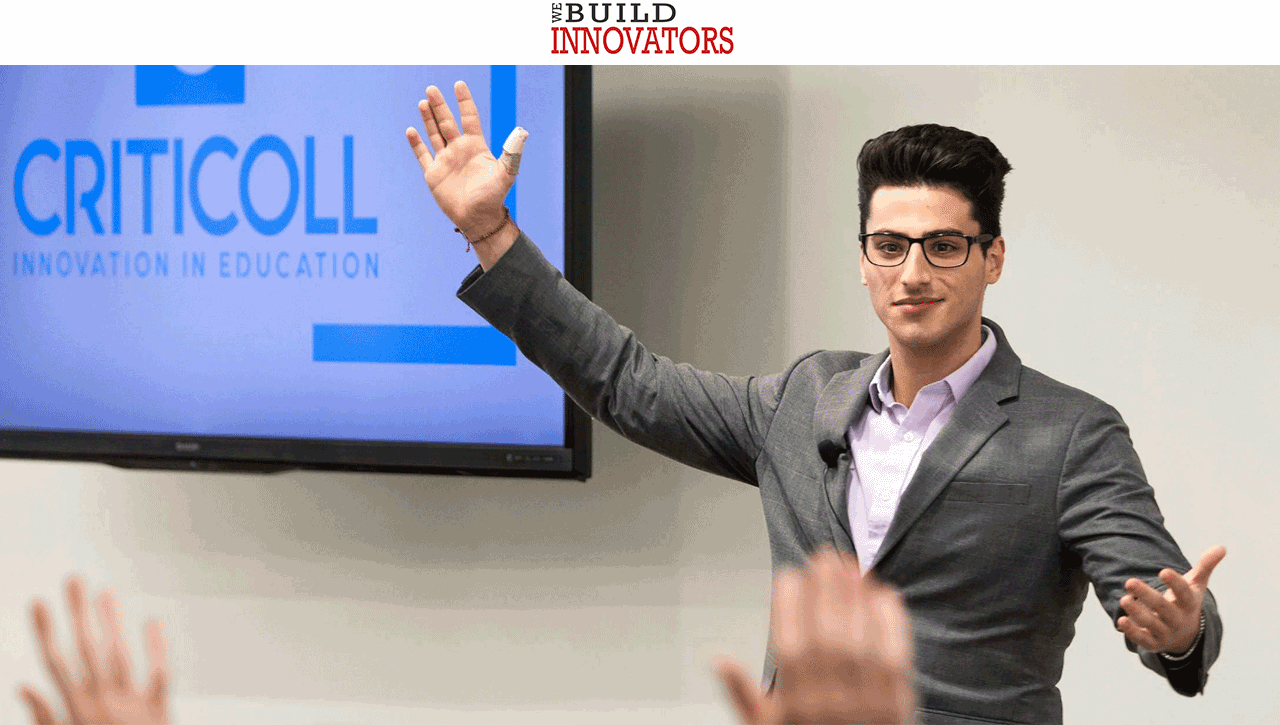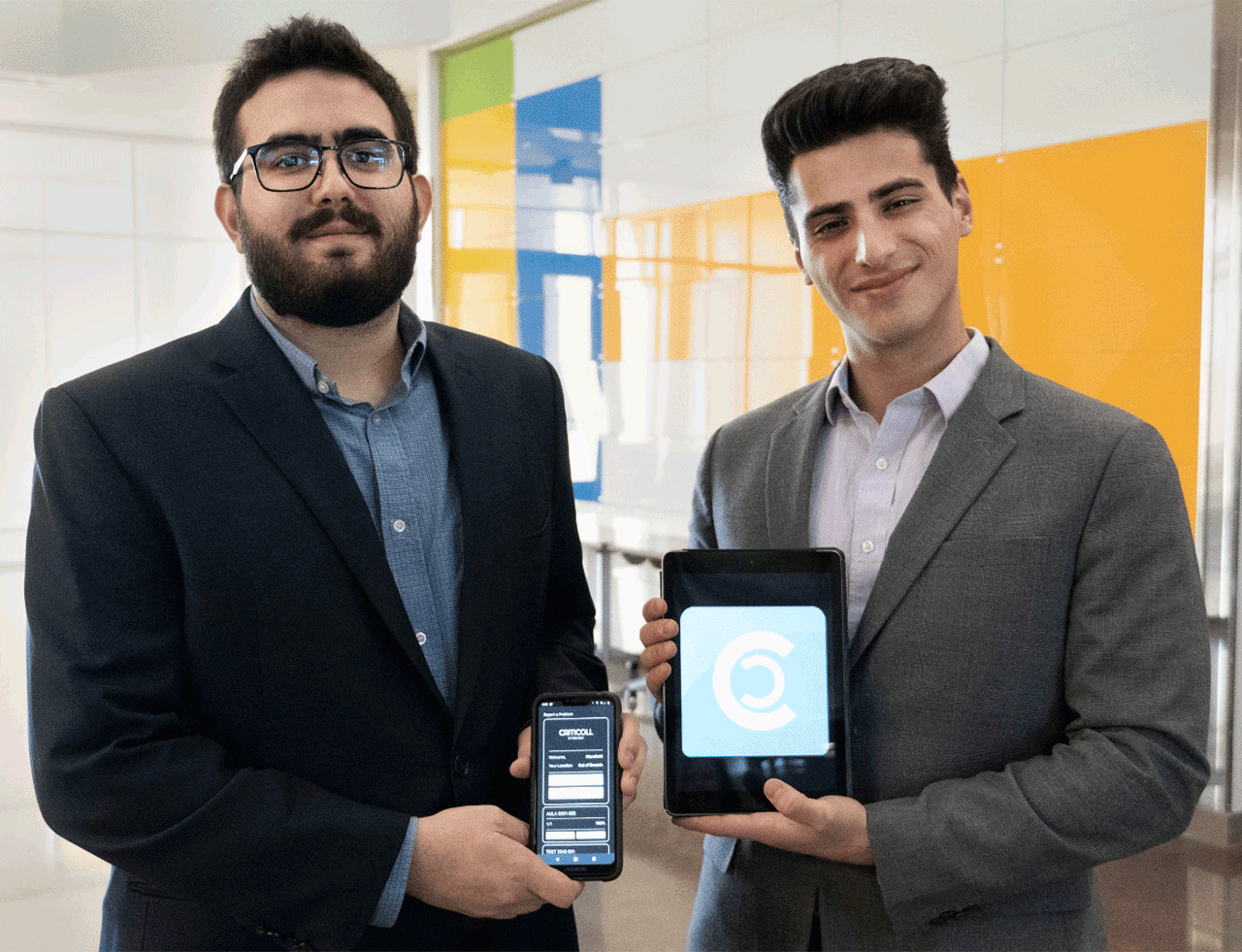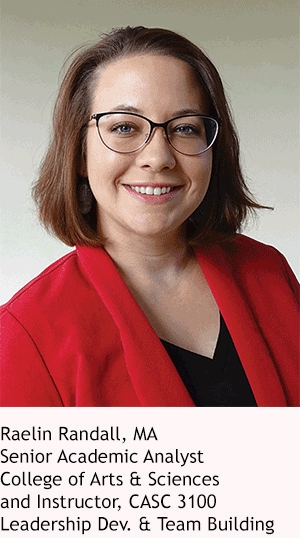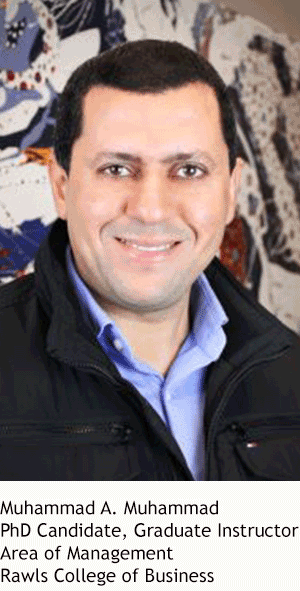Leading the Way

Texas Tech University senior and entrepreneur Matheus Pagotti gives a presentation on his new attendance-taking app, CritiColl.
CritiColl Makes Attendance-Taking Easy & Affordable
Matheus Pagotti & Pedro Marafiotti Develop Roll-Call App
4.29.2020 by Toni Salama
There's an old joke among actors: "It only took me 20 years to become an overnight success."
Texas Tech University seniors Matheus Pagotti and Pedro Marafiotti have been working on their success story only a fraction as long, but in those few years they've developed an easy-to-use—and affordable—attendance-taking app. Their brainchild, CritiColl, is one of eight startup companies accepted this spring into the 2020 Texas Tech Accelerator program.
Already, CritiColl is making a difference in the courses that have adopted it.

Entrepreneurs Pedro Marafiotti, at left, and Matheus Pagotti, both TTU seniors, were accepted into the 2020 Texas Tech Accelerator program for their startup business, CritiColl, a new attendance-taking app.
Launching a Win-Win
As spring 2020 began, Jorge Iber was facing as large a class as he'd ever taught. The old pen-and-paper sign-in sheet wasn't going to cut it.
"With a class of 440 students, I needed some other way," said Iber, a professor in the Department of History and an associate dean in the College of Arts & Sciences.
 Using CritiColl, all students need do is download the free CritiColl app to their
cell phones, then take an in-phone photo of a QR code for the specific class and date.
CritiColl uses geolocation to verify that each student is indeed physically sitting
in the classroom—or attending in cyberspace when courses moved online in response
to the COVID-19 pandemic. And because CritiColl's QRs are unique to each student,
the codes can't be shared.
Using CritiColl, all students need do is download the free CritiColl app to their
cell phones, then take an in-phone photo of a QR code for the specific class and date.
CritiColl uses geolocation to verify that each student is indeed physically sitting
in the classroom—or attending in cyberspace when courses moved online in response
to the COVID-19 pandemic. And because CritiColl's QRs are unique to each student,
the codes can't be shared.
CritiColl's faculty portal allows instructors to see class attendance both in real time and cumulatively, virtually automating attendance tracking and grading. Faculty who want to see which students are still paying attention 45 minutes into the lesson can take attendance again if they like. Dashboards can be customized to meet other requirements and, as CritiColl continues its rollout, features are fine-tuned.
All attendance data is online from the get-go, so the days of inputting hand-written charts—the time-sink, the margin for error—are a thing of the past.
"I found that the app works very well overall," Iber said, "although it did have some bugs at first." But when an issue arose, Iber said Pagotti was quick about getting back and resolving the problem. "His response was outstanding."
Michael Vitro, a Counseling Psychology graduate instructor in the Department of Psychological Sciences, said he was skeptical when Pagotti first approached him in spring 2019 with the prospect of using CritiColl to take roll in his courses: "I have a lot of issues with technology," Vitro explained.
"At that point I had already taught one-and-a-half semesters," Vitro said of his class of some 80 students. "But I was using a sign-in sheet and the line was out the door."
Vitro decided to give it a try and found that CritiColl enhanced his teaching experience because it freed him to direct more attention toward teaching rather than record-keeping. He also found that, with all the information in one place, the app made attendance grading easier at the end of the semester. Vitro said CritiColl was so beneficial that he employed the app in a second class of 110 students, who unanimously liked it.
"Using it takes just a few clicks, and it's easy to understand," Vitro said. "And I think it improved attendance, even though students can't have a friend sign in for them."
 Raelin Randall, MA, a senior academic analyst for the College of Arts and Sciences,
said the students in her Leadership Development & Team Building course like the CritiColl
app.
Raelin Randall, MA, a senior academic analyst for the College of Arts and Sciences,
said the students in her Leadership Development & Team Building course like the CritiColl
app.
"CritiColl is very simple to use," Randall said, "and the students seem to like having the ability to check their attendance percentage right from their phone."
Before the COVID-19 pandemic forced all courses online, Randall was using CritiColl for both attendance and participation in her spring 2020 course.
"During that time, the CritiColl team helped to design a format that helped me keep track of not only attendance but the participation content of the course as well," Randall said. "Also, I do not have to worry about input error on my end because the codes for each day are easily organized by the program. It really made everything very easy."
Where Great Ideas Come From
Like so many other inventions, the CritiColl software application that now makes attendance-keeping a breeze, started out to serve an entirely different purpose.
Matheus Pagotti, a senior Business Administration in Information Technology (IT) major in the Rawls College of Business Administration (RCOBA) and CritiColl's CEO, met with absolute disaster—his words—during his first semester in university.
"I failed to properly manage my responsibilities as a student. Because of this, I became frustrated with my poor performance, and so I sought out a solution," Pagotti said. He went in search of any mobile applications that could help him organize all the elements that can make a college student's life difficult.
There weren't any.
Pagotti saw this as an opportunity to help himself and other struggling students: He'd create an application that would promote daily academic success by helping students self-organize. But he wouldn't do it alone. Pagotti would call on Pedro Marafiotti, a senior IT major in RCOBA and now CritiColl's COO, to join him. Felipe Melz, who studied mechanical engineering at Universidade Federal de São Carlos, Brazil, would round out CritiColl's executive team as chief technology officer.
After finalizing their initial business plan, they sought advice from Texas Tech University's Innovation Hub at Research Park, which mentored CritiColl during its early stages of startup.
"The Innovation Hub team taught Pedro and me how to conduct customer interviews, how to interpret customer discovery, and how to become an entrepreneur," Pagotti said.
In the years that followed, CritiColl entered every business competition—and took all the accompanying advice—the Innovation Hub offered.
"Each competition helped us to identify flaws within our structure and how to go about strengthening our internal structures within the application," Pagotti said. "With this instruction, Pedro and I changed our application's aim, goals, and product delivery."
The CritiColl team also collaborated with colleagues in the Whitacre College of Engineering to generate the app's QR codes.
"Today, we have developed an application that increases student performance and faculty productivity via app-based communications in which class attendance is recorded in a matter of seconds," Pagotti said.
CritiColl was first tested at Texas Tech during the spring 2019 semester in one classroom of roughly 40 students. The team officially launched CritiColl in the fall 2019 semester, when the app was used in two Texas Tech classrooms with a total of about 170 students. As spring 2020 semester began, CritiColl was serving 10 Texas Tech classes totaling nearly 950 student-users.
 Brent W. Lindquist, dean of the College of Arts & Sciences and a longtime mentor of CritiColl, said, "Matheus Pagotti and his CritiColl team
display the entrepreneurial drive and determination that embodies the 'We Build Innovators'
spirit of the College of Arts & Sciences."
Brent W. Lindquist, dean of the College of Arts & Sciences and a longtime mentor of CritiColl, said, "Matheus Pagotti and his CritiColl team
display the entrepreneurial drive and determination that embodies the 'We Build Innovators'
spirit of the College of Arts & Sciences."
Lindquist was particularly impressed with CritiColl's quick solution for the switch to all-online classes, made necessary by the COVID-19 pandemic.
"Their rapid response to enhance their application to accommodate Texas Tech's move to fully online course delivery in the middle of this spring semester further reflects a West Texas 'can do' attitude," Lindquist said. "It has been a real pleasure to provide them with advice and support."
What's Possible from Here
CritiColl is not the first attendance-tracking software on the market. Pagotti says his company faces competition from Top Hat and CourseKey—assuming students don't mind paying something in the range of $30 to $40 out-of-pocket.
Pagotti and Marafiotti are pursuing a business deal that would cost students only a fraction of that figure.
 "If we get a licensing agreement with Texas Tech, then we would charge only $2 per
student through student fees to the university," Pagotti said. "That way, it would
come out of tuition and fees, not straight out of students' pockets."
"If we get a licensing agreement with Texas Tech, then we would charge only $2 per
student through student fees to the university," Pagotti said. "That way, it would
come out of tuition and fees, not straight out of students' pockets."
They believe a groundswell of satisfied users from across campus can only strengthen their cause.
Nihar Sreepada, a PhD student and graduate instructor in the College of Media & Communication, implemented CritiColl in the International & Multicultural Public Relations class he's teaching this semester.
"CritiColl is really easy to use. It has a simple interface, and I've gotten good feedback from students; they like it better than (one of the competitors) because it's free," Sreepada said. "The idea here is to have something very do-able. We don't need something fancy."
Muhammad A. Muhammad, PhD candidate and graduate instructor of Business Management in RCOBA, deployed CritiColl this semester after Texas Tech moved to online classes. Like other instructors currently taking roll with CritiColl, he said student response is highly positive.
 "I think it is a user-friendly app that only requires minimum training for both the
instructor and the student," Muhammad said. "It takes less than a minute to generate
a dynamic code and take attendance for any number of students. I like its simplicity
and effectiveness, and I think it truly improves the classroom attendance-taking experience
and makes it hassle-free."
"I think it is a user-friendly app that only requires minimum training for both the
instructor and the student," Muhammad said. "It takes less than a minute to generate
a dynamic code and take attendance for any number of students. I like its simplicity
and effectiveness, and I think it truly improves the classroom attendance-taking experience
and makes it hassle-free."
Pedro Marafiotti, the CritiColl COO who also is pursuing a second major in Business Management with a concentration in Strategic Entrepreneurship & Innovation, and his co-executives envision a day when the CritiColl app may become the main tool universities use for taking attendance.
He understands that will take time, ongoing innovation and hard work.
"During the early stages of a startup, we say that 'everybody does everything,'" Marafiotti explained. "We don't have a strict definition of what each member should exactly do."
Pagotti and Marafiotti both contact new professors, introduce the platform and help with its deployment, implement new features, and approach university officials for support. Marafiotti also directs the company's financial planning and strategic plan for growth—while keeping an eye on reducing first-year expenses and maintaining product quality.
CritiColl's goals are big but entirely reachable, Marafiotti said.
"Our dream goal would be to reach 1% of all American universities until our fifth or sixth year of operation," Marafiotti said. "If we can license the application to one big university in the next 12 to 18 months, it will give us enough credibility to start growing almost exponentially from year to year. I'm sure that with the help of Texas Tech and the Innovation Hub we will be able to achieve this goal."
![]()
College of Arts & Sciences
-
Address
Texas Tech University, Box 41034, Lubbock, TX 79409-1034 -
Phone
806.742.3831 -
Email
arts-and-sciences@ttu.edu
